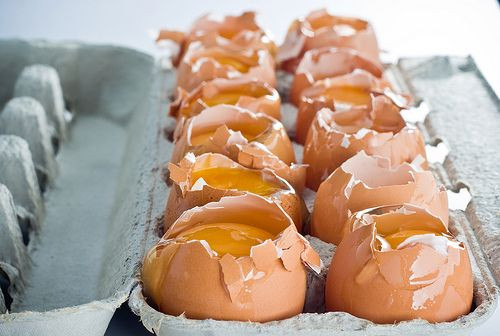Plant-Based ‘Beyond Eggs’ Use No Corn Or Soy To Mimic Egg; Backer Bill Gates 'Can't Tell The Difference'

The world’s first plant-based artificial egg went on sale in a California Whole Foods Wednesday, marking the potential start of an industry-wide shift in the reliance on corn and soy. “Beyond Eggs” use a mixture of 11 plants, including peas and beans, to recreate the versatility of its real-life doppelganger.
Backed by Khosla Ventures and Founders Fund, each backed in part by Bill Gates and Tony Blair respectively, Beyond Eggs is the brainchild of Hampton Creek Food’s CEO Josh Tetrick. Tetrick, who is neither a chef nor a scientist, points to the 1.8 trillion eggs laid each year that come from “places that normal people do not what their food to come from” as the inspiration for his project.
The Ethics Of Going Eggless
Tetrick assembled a robust arsenal of experts to craft the egg substitute. Relying upon the intellects of chefs, biologists, engineers, and other science PhDs, Tetrick and his team have worked on over 344 prototypes for their egg yolk product, and have studied 287 types of plants that range from peas to canola, according to GigaOM.
“We want to take animals out of the equation,” Tetrick told the Daily Mail. “The food industry is begging for innovation, especially where animals are involved – it is a broken industry.”
Much of the controversy surrounding chicken farming concerns chickens' health and living conditions. To keep the chickens at a certain level of fatness, for minimal cost, farmers often keep them on a steady diet of corn and soy — two products that health advocates claim contribute to carbon emissions and are notoriously treated with genetically modified organisms (GMOs), a fact often left out of a lot of food labeling. Additionally, animal rights activists question the morality of many commercial chicken farms, which house the chickens in too-small cages, or pack them in dark, open rooms and sell their eggs and meat under the guise of “cage-free” and “free range.”
"Ninety-nine percent of our eggs come from dimly-lit, feces- and urine-smelling industrial warehouses," Tetrick said. "Putting aside animal-cruelty, it's just gross."
The problem is, chickens produce a stunning array of luxuries for the modern diet, one of which are nutritive, protein-packed eggs. So far, the leaps in egg-free baking have been marginal by many accounts. Eggs work as a natural binder in baked goods, in ways that other ingredients, such as flax and chia seeds, chickpea four, and vinegar, can’t recreate. They can produce the “lift” but not the bind, chefs often say.
"I've been cooking egg-free for over 16 years now and honestly I haven't been fully satisfied with any products yet," Allyson Kramer, vegan and gluten-free cookbook author, told Fox News.
Tetrick says his product is different. Even the most ardent omnivores, by his account, haven’t been able to tell the difference between his plant-based eggs and the real thing when used in cookies.
"My dad is a steak-and-potatoes kind of guy and loves it," he said. "Bill Gates and Tony Blair couldn't tell the difference."
A Replacement On The Horizon?
Beyond Eggs showed promise in recreating egg’s natural binding agency in some foods more than others. Muffins, cakes, and cookies — baked goods that rely on the egg’s yolk, something Beyond Eggs has made great strides in mimicking — fare pretty well in taste tests. The eggs also work well with oil to produce mayonnaise, which Hampton Creek calls “Just Mayo.” Scrambled eggs have proven more challenging.
“They just wouldn’t congeal at all,” Tetrick said, adding that they “had a really bad aftertaste.”
While Beyond Eggs currently sell for $1.83 per dozen (19 percent cheaper, Tetrick says, than regular eggs), stay on the shelf longer, offer greater health benefits, and are safer overall, some industry analysts argue that the company has too far an uphill climb to overtake the giants of agribusiness that currently dominate the space.
"Realistically they are never going to replace any significant amount of the poultry industry," Raymond Glahn, U.S. Department of Agriculture research physiologist, told Fox News. "Products like these come along all the time."
Hampton Creek envisions a future where international sustainability is possible through the use of their plant-based eggs — “to one thing that will replace everything,” as Tetrick says. If a country displays deficiencies in certain aspects of its diet, the firm hopes to compensate by offering the necessary substitutes, and to hopefully restructure the entire business of farming in the process.
“What we want to do eventually is find a way to work with farmers in the developing world to enable them to have new cash crops that can be used,” Tetrick told the Daily Mail. “Then we become the kind of company to be feared by the bad guys in the industry.”
Published by Medicaldaily.com



























